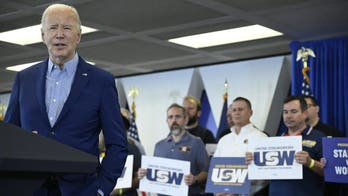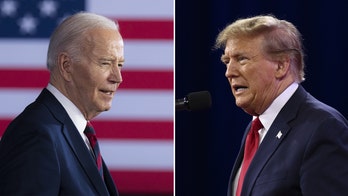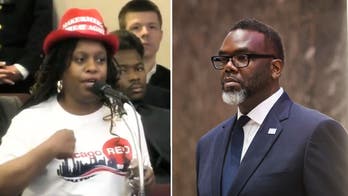Around 9:30 am Tuesday morning, the House Sergeant at Arms' office sent an electronic reminder to all Congressional staff. No one should be alarmed when the Space Shuttle Discovery buzzes the Capitol grounds during four flyovers while riding shotgun aboard a massive, NASA 747.
Discovery was en route to be mothballed at the Smithsonian's Udvar-Hazy Center next to Dulles International Airport, west of Washington. But not before Discovery made four passes as low as 1,500 feet over downtown Washington.
The shuttle's first overflight would come to the west of the Capitol, visible from the National Mall. The second would come to the east of the Capitol. The shuttle's final two sallies would take it to the south, visible from the House of Representatives.
"This flight will be carefully monitored and controlled by the FAA and law enforcement," comforted the message. "There is no cause for alarm."
GOP members of Congress, huddling at the Republican National Committee headquarters near the Capitol, piled out of a morning meeting to catch a glimpse of the air show. Rep. Diane Black (R-TN) could barely contain her glee, ooo-ing and ah-ing as the shuttle glided above the capital city.
House Majority Leader Eric Cantor (R-VA), Majority Whip Kevin McCarthy (R-CA), House Republican Conference Chairman Jeb Hensarling (R-TX) and GOP Vice Chair Cathy McMorris Rodgers (R-WA) briefly delayed a press conference to see Discovery. They stepped out into the street by the Capitol South Metro station to view the shuttle's final mission.
Some missed seeing Discovery's first pass. But that was alright. It was coming around again.
++++++++++++++++++++++++++++++++++++++++++++++++++++++++++++++
The House of Representatives is poised today to consider yet another version of a stalled transportation and infrastructure bill. The legislation features a sordid legislative history and has flummoxed the GOP leadership since its inception last fall.
In fact, the bill is a lot like Discovery and its multiple sorties around the Capitol. If you missed the transportation bill the first time, it returns again and again.
Frequently at low-altitude.
And unlike the message aimed to calm the Capitol Hill community about shuttle's terminal voyage, there's been plenty of cause for alarm over the transportation legislation - even as Congressional leaders closely monitored the measure's flight path.
House Speaker John Boehner (R-OH) initially rolled out the concept for a fundamentally different transportation bill last fall. Revenue generated by new energy development would fund the transit programs. Plus, Boehner's bill would be free of earmarks, items tucked into legislation to lure yea votes from otherwise recalcitrant lawmakers. In January, House Transportation Committee Chairman John Mica (R-FL) introduced a five-year, $260 billion package designed to jump-start road construction and modernize the nation's crumbling infrastructure.
But the bill met startlingly fierce opposition.
Democrats denounced the plan as skimping on safety and environmental protections. A group of conservative Republicans, leery of "big government," balked at the comprehensive transportation approach.
In late March, many of the nation's transportation programs came dangerously close to expiring, forcing a potential shutdown of construction efforts and the Federal Highway Administration. Both the House and Senate approved a temporary extension in late March to avert a shutdown.
The Senate overwhelmingly passed a bipartisan highway bill a few weeks ago. But the House hasn't. So the new bill the House takes up today is an effort to "get to conference."
Here's what that means: House Republicans and Democrats can crow all they want about what they hate about the transportation bill. But they have little bargaining power unless the House at least approves some version of the measure. Then the House and Senate are on equal parliamentary footing. Both bodies will have okayed a transportation bill, teeing up the potential for a House/Senate conference committee. A conference committee is where the House and Senate blend the two bills together into a final product.
So, today's bill is an "effort to get to conference." But the House GOP brass had to do some last-minute, heavy-lifting just to craft a bill which would potentially coax a majority of members to support it.
"They're doing the whip count," said Mica, noting the leadership was adding a few amendments "to get some more votes."
In Congressional parlance, add-ons to sweeten a bill are often called "riders." This is like the space shuttle. The spacecraft can't fly by itself. So it's a "rider" on top of NASA's 747. And Republicans knew they were going to have to load up the latest iteration of the transportation bill with the best rider they could find: the Keystone pipeline.
This provision strips the Obama Administration of the right to grant a permit to build the Keystone pipeline through the nation's mid-section. Instead, the bill transfers the permitting authority to the Federal Energy Regulatory Commission (FERC). It's thought that FERC would expedite the approval process.
Keystone is a significant sweetener to the transportation bill. Many Democrats outright rejected the original version of the transportation package. But including Keystone could whet the appetite of about 40-50 House Democrats and convince them to vote yes.
The Republican majority has tried this tactic many times before over the past 16 months. The GOP has turned to Democrats when unable to conjure the votes from their side of the aisle on a "must-pass" piece of legislation.
"Mr. Boehner, I think does in fact want to go to conference so that he can try to get something done on an item he has said is a priority which he cannot get done with the votes in his own caucus," declared House Minority Whip Steny Hoyer (D-MD).
Hoyer said that he didn't "feel abused" that Republicans have repeatedly come to him in an effort to find votes on the Democratic side of the aisle on major bills during this Congress.
"Obviously his own party is not backing him up," said Hoyer of Boehner's efforts to find the votes.
But on the transportation package, it became clear that Republicans wanted to ensure they had the votes on both sides of the aisle. The GOP prepped the final version of the bill with three additional amendments, each designed to bolster its appeal.
One amendment limited red tape and permits for transportation projects. Another amendment asked the government to direct money from the Harbor Maintenance Trust Fund toward important river dredging projects. The final amendment attempted to diminish regulations on coal ash, an energy production byproduct which some argue is unhealthy. The ash is used to make concrete, resurface roads and finish parking lots.
The House has approved the Keystone provision before. The same goes with the coal ash amendment. But a House GOP leadership aide noted that the coal ash amendment could make it "tough" for Rep. Nick Rahall (D-WV), the top Democrat on the transportation panel, to vote no.
"I've not been consulted at all in this," said Rahall, who represents coal country.
By the same token, the harbor maintenance language impressed some conservatives who may have be reluctant to vote yes otherwise.
"I got exactly what I wanted," said Rep. Jeff Landry (R-LA), who represents the Mississippi River Bayou. Landry has long pushed for dredging projects along the Mississippi.
There may be no earmarks in this bill. But the Republican leadership appears to have laced the measure with targeted perquisites designed to court skeptical lawmakers.
Landry thought this approach was better than rewarding individual earmarks to lawmakers in exchange for their votes.
"Earmarks are like buying people off," Landry said. "These are policy pieces. They're not as bad as earmarks."
Over the past few months, John Mica has repeatedly reminded his colleagues Congress has approved nine stopgap transportation extensions. Still, some Congressional sources were unconvinced the riders would be enough to usher the bill to passage.
But that wasn't the case with Mica.
"I'm a persistent son-of-gun," said Mica. "Trust me baby, trust me!"
And if these new ingredients fail to enhance the bill, chances are the transportation bill will swing back around for yet another pass.
Just like the space shuttle cruising over downtown Washington.




